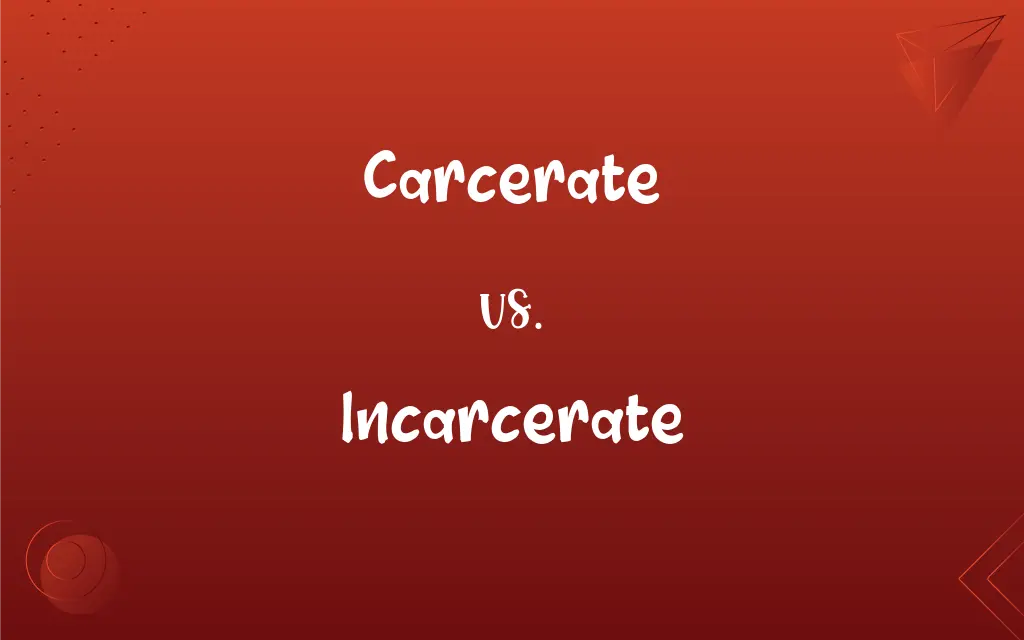Carcerate vs. Incarcerate: What's the Difference?
Edited by Aimie Carlson || By Harlon Moss || Updated on November 6, 2023
"Carcerate" means to imprison or confine, while "incarcerate" specifically refers to the legal system's act of detaining someone in a prison.

Key Differences
Carcerate and incarcerate both relate to confinement, but their usage differs. Carcerate is a less common term and can refer to any act of imprisonment or confinement. Incarcerate is specifically used in a legal context, referring to the act of putting someone in prison by the authorities.
While carcerate can be used metaphorically to describe situations that feel confining or limiting, incarcerate is typically used for actual imprisonment within the criminal justice system. For example, one might feel carcerated by circumstances, but only a court can incarcerate a person.
Both terms stem from the Latin word "carcer," meaning prison. Carcerate might be used in various contexts, both literally and figuratively, to imply restriction or confinement. Incarcerate, on the other hand, is a formal term used when someone is officially imprisoned following a legal process.
The term carcerate may appear in literary or rhetorical contexts, emphasizing the act of confinement without the legal connotations of incarcerate. Incarcerate is more likely to be found in legal documents, news reports, and formal discussions about the penal system.
Carcerate is generally not used in legal documents or official terminology, whereas incarcerate is widely recognized and used in laws, legal proceedings, and by law enforcement agencies to denote the act of detention in a penal institution.
ADVERTISEMENT
Comparison Chart
Definition
To confine or imprison
To legally detain someone in a prison
Usage
Broad, can be metaphorical or literal
Specifically legal and formal
Context
Can be used in various contexts
Used in the context of the criminal justice system
Connotation
Generally neutral, can be metaphorical
Specifically refers to legal imprisonment
Prevalence
Less common term
Widely recognized in legal and formal contexts
ADVERTISEMENT
Carcerate and Incarcerate Definitions
Carcerate
To be trapped or unable to move freely.
He felt carcerated by the endless rules and regulations.
Incarcerate
To place into custody in a correctional institution.
The young man was incarcerated after repeated offenses.
Carcerate
To restrict movement or activity.
The injury carcerated him to his bed for weeks.
Incarcerate
Legal jargon for putting someone in jail or prison.
The new law may incarcerate individuals for computer fraud.
Carcerate
To bind or hold in a limiting condition or situation.
The contract carcerated her to a single employer for years.
Incarcerate
To imprison someone by legal authority.
The court decided to incarcerate the offender for ten years.
Carcerate
To confine or restrict freedom in any manner.
The bird was carcerated in a small, gilded cage.
Incarcerate
To detain in a judicial facility.
After the verdict, the defendant was immediately incarcerated.
Carcerate
To imprison or put in a confined space.
The magician carcerated his assistant in the box as part of the act.
Incarcerate
To confine within the penal system.
Many advocates argue for alternatives to incarcerate non-violent criminals.
Carcerate
(rare) To imprison or confine
Incarcerate
To put in a prison or jail.
Incarcerate
To shut in; confine.
Incarcerate
To lock away; to imprison, especially for breaking the law.
Incarcerate
To confine; to shut up or enclose; to hem in.
Incarcerate
To imprison; to confine in a jail or prison.
Incarcerate
To confine; to shut up or inclose; to hem in.
Incarcerate
Imprisoned.
Incarcerate
Lock up or confine, in or as in a jail;
The suspects were imprisoned without trial
The murderer was incarcerated for the rest of his life
FAQs
Can we use carcerate in a legal document?
It's not standard; incarcerate is the correct legal term.
What does carcerate mean?
Carcerate means to confine, restrict, or imprison.
Can animals be carcerated?
Yes, in the sense of being confined.
Is incarcerate used outside legal contexts?
Rarely, it's predominantly a legal term.
What is the etymology of carcerate?
It comes from the Latin "carcer," meaning prison.
What is the etymology of incarcerate?
Also from "carcer," but with a legal implication.
What does incarcerate mean?
Incarcerate means to legally detain someone in prison.
Are carcerate and incarcerate interchangeable?
Not exactly; incarcerate is a legal term, while carcerate is broader and less formal.
Can one self-carcerate?
Metaphorically, yes, in the sense of self-imposed restrictions.
What's the noun form of carcerate?
It's not commonly used; incarceration is the noun for incarcerate.
Is carcerate a common English word?
No, it's relatively rare.
Are there synonyms for carcerate?
Yes, like confine, imprison, or restrict.
What's the legal consequence of being incarcerated?
It involves a criminal record and loss of certain freedoms.
Can someone be carcerated without being incarcerated?
Yes, in metaphorical or non-legal contexts.
Does carcerate imply a duration of confinement?
No, it does not specify duration.
Is incarcerate a common English word?
Yes, in legal and formal contexts.
Does incarcerate imply a duration of confinement?
Often yes, as determined by a legal sentence.
Can animals be incarcerated?
Not in the legal sense; the term is for humans.
Are there synonyms for incarcerate?
Yes, such as imprison, jail, or detain.
Can one self-incarcerate?
Not in the usual sense, as it involves legal authority.
About Author
Written by
Harlon MossHarlon is a seasoned quality moderator and accomplished content writer for Difference Wiki. An alumnus of the prestigious University of California, he earned his degree in Computer Science. Leveraging his academic background, Harlon brings a meticulous and informed perspective to his work, ensuring content accuracy and excellence.
Edited by
Aimie CarlsonAimie Carlson, holding a master's degree in English literature, is a fervent English language enthusiast. She lends her writing talents to Difference Wiki, a prominent website that specializes in comparisons, offering readers insightful analyses that both captivate and inform.































































